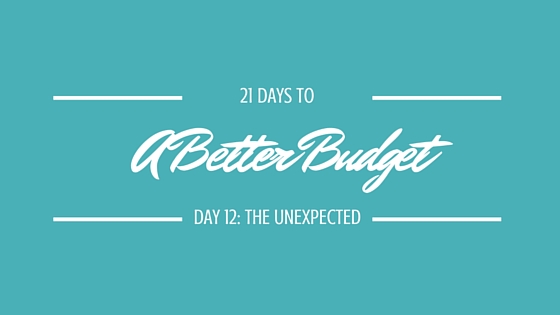
Last week, we worked on identifying the major “categories” for your budget:Fixed expenses, variable expenses, future expenses, and “blow money” (a small but essential category!).
Today, I want to point out one more very important category: Planning for the stuff you don’t know is going to happen.
But wait! How can you plan for what you don’t even know?!
It’s not an exact science, but it’s called an Emergency Fund. The sad reality is that none of us will get through life “unscathed”. From leaky roofs to job losses, from car accidents to health crises, life can be very difficult sometimes – and very costly.
Let me be clear: No amount of money will inoculate us from life’s woes.
But it can provide us with a bit of breathing room, so we can focus on fixing, healing, repairing, finding, or, when necessary, grieving – instead of having to contend with the double “whammy” of a personal crisis plus a money crisis.
Click Here to Subscribe to the FREE 21 Days to a Better Budget Newsletter
Let’s take something small, in the grand scheme of things: A broken-beyond-repair washing machine. With a family of five, I know that after a three-day yomtov, things are starting to smell. So imagine if you had to go weeks without a washer. It would be dire straights.
If you have an emergency fund, it’s a pretty straight-forward equation: You shop around, find the best deal, and get that machine. The crisis is short-lived and you’re back in business without missing a beat. Over the next few months, you will cut back where you can to save those funds back into your emergency account.
But what if you don’t have an emergency fund? Then odds are that new washing machine will go on your credit card and you will be paying it off over the next couple of months. Every month will be a little more stressful than the last, because you know that as that interest grows, so does the real price of your new washing machine.
By having an emergency fund, you eliminate — or seriously minimize — that prolonged money stress. It’s not that you aren’t upset about whatever the emergency is; but rather that your upset isn’t compounded by “how are we going to pay for this?!” angst.
And this is just one small example – of a broken washing machine. You can read another example here.
Let me tell you one other amazingly cool thing I’ve discovered about having an Emergency Fund: Since you have to work so hard to save all that money, you aren’t going to part with it easily. Swiping the credit card is easy. Parting with your hard-saved cash, on the other hand, gives you pause. When I’m spending money out of my Emergency Fund, I’m doubly careful: Is this really something I need right now; can I make do or do without? And if I am going to spend money, am I getting the best value I possibly can? I’m a far savvier consumer when it’s coming from my bank account than from the charge card.
How much money do you need in your Emergency Fund?
Different experts will tell you different things – I’ve read everything from one month worth of expenses to one year’s. If you are self-employed or employed in a highly volatile industry, you may need a more robust fund. If you have two earners at home, both with steady jobs, you may decide that two or three month’s worth is enough.
Since most of us can’t save several thousands or even tens of thousands of dollars over night, you should break that goal down into bite-size chunks. If you don’t have any emergency savings, start with a goal of somewhere between $500 and $2000. I recommend having at least enough to cover the deductible on your home and/or auto insurance policy. Break that goal down into a per month amount — with the aim to get there as quickly as possible.
Once you have hit this initial goal, set a new goal, again with monthly targets that you can build into your budget.
As with every other expense in your budget, you must balance priorities. But keep in mind that once your Emergency Fund is fully funded, minor (and even some major) crises are less likely to derail your progress, since you will have the cash on hand to solve the problem.
Your homework assignment for tonight is to take stock of your Emergency Fund situation. If you have one, evaluate if the amount is sufficient. If it’s not, set a goal and break that goal down into monthly targets.
If you don’t yet have an Emergency Fund, make it priority #1 to set aside between $500 and $2000 over the next 6-8 weeks. Once you have your “baby” emergency fund in place, you can re-evaluate your next steps.
Over the last week, you have identified a lot of “jobs” for your money. By this point in the process, you may be starting too worry that there are more jobs than money. Stay tuned for tomorrow when we will be talking about how to handle this most common problem for budgeters.
Click Here to Subscribe to the FREE 21 Days to a Better Budget Newsletter















Leave a Comment